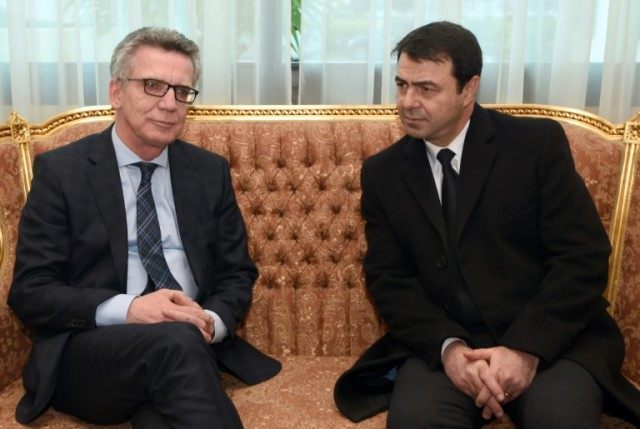Tunis (AFP) – Tunisia and Germany have agreed to speed up the repatriation of rejected asylum-seekers from the North African country, German Interior Minister Thomas de Maiziere said on Tuesday.
He said the two countries were also seeking to boost security cooperation, namely with Berlin training border guards to secure the frontier with its conflict-hit neighbour Libya.
After taking in more than one million asylum-seekers last year, Germany is trying to reduce arrivals, including with a law to declare Morocco, Algeria and Tunisia as safe countries of origin.
De Maiziere, speaking in Tunis at the end of a tour of the three countries, said a first group of 20 Tunisians who failed to secure asylum in Germany would soon be repatriated.
This “pilot project” would test the ground to ensure the “efficiency” of the system and pave the way for further returns, he said.
“These repatriations would not concern the tens of thousands of Tunisians who live legally in Germany (where) they run small businesses, live normally and pay their taxes,” he said.
Human rights groups oppose the designation of the three Maghreb countries as “safe” under legislation awaiting upper house approval that would drastically limit their nationals from seeking asylum in Germany.
They point to discrimination against homosexuals and curbs on free speech and assembly.
De Maiziere rejected the criticism, saying that although designated safe countries are assumed to not systematically persecute their citizens, individual requests for protection would still be considered.
He also said that his talks in Morocco had been “very satisfactory” and that he had “intense” discussions in Algeria.
Chancellor Angela Merkel has come under intense pressure to limit the influx of migrants, mainly from war-torn Syria, Iraq and Afghanistan, with the southern state of Bavaria demanding permanent controls on its border with Austria.
De Maiziere also spoke of bolstering security ties with Tunisia, specially along the border with Libya, where the Islamic State group has gained a foothold, and to battle terrorism.
Last month the German newspaper Bild am Sonntag said Germany was considering sending troops to Tunisia to help train soldiers in the fight against IS.
And on Monday British Defence Minister Michael Fallon told parliament his country would be sending a training team to Tunisia to help stop people illegally entering from Libya.
IS has claimed responsibility for three bombings last year in Tunisia that killed dozens of people, including 59 foreign tourists. It has been blamed for a series of atrocities in Libya.
Western countries have agreed that military action is needed to dislodge IS in Libya — which lies on Europe’s doorstep — but world powers want a national unity government installed to request help before formally intervening.
On Tuesday, De Maiziere presented Tunisia with military supplies, including four-wheel drive vehicles, flak jackets and night vision equipment.

COMMENTS
Please let us know if you're having issues with commenting.